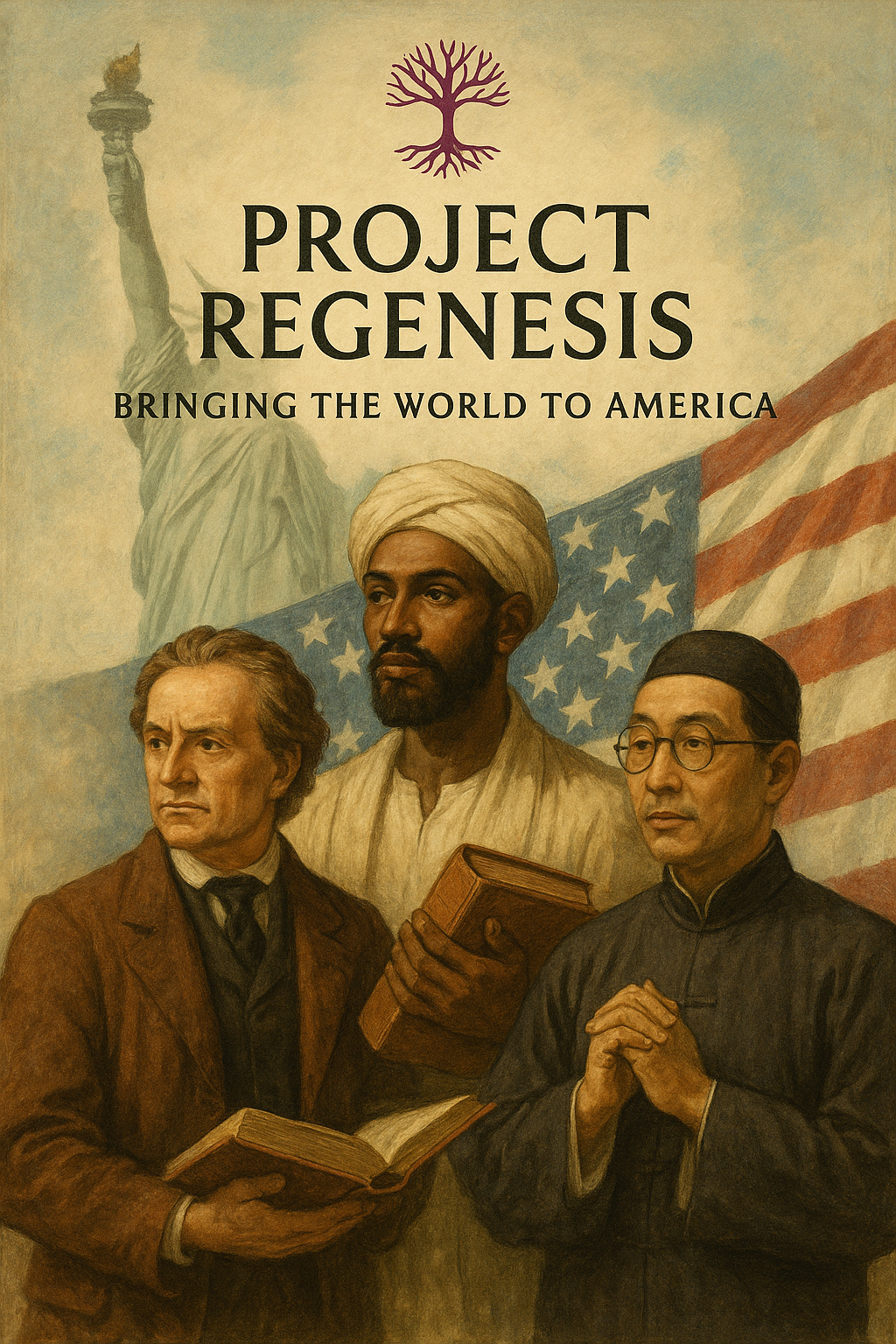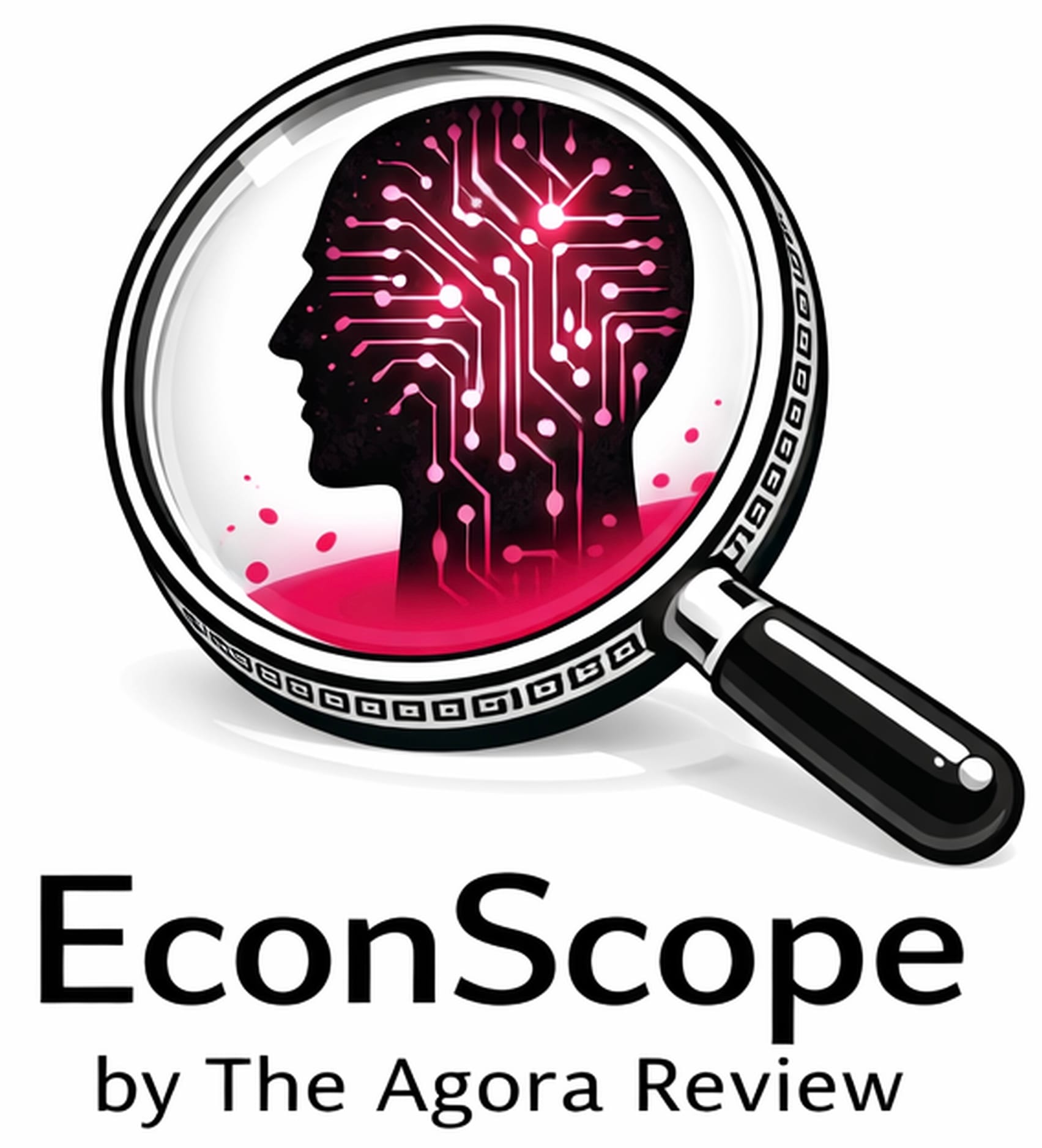Project ReGenesis: Bringing the World to America
Modern societies excel at discovery but struggle with remembrance. America’s renewal may come not from new debates but from old connections.

A global campaign to reconnect America to the world that shaped it
Prologue — In a Time of Division, a Call to Remember Together
Every generation inherits both its freedoms and its fractures.
Ours has inherited abundance and estrangement at once: technology that connects every voice, yet a public square that no longer listens.
The noise of the present often drowns out the long conversation that made the present possible.
Across the political spectrum, Americans sense fatigue — the feeling that argument has replaced meaning, and that community has thinned into competition.
But beneath this turbulence lies a quieter truth: what unites the nation has never been uniformity of opinion, but a shared imagination about who 'we' are and where 'we' come from.
Project ReGenesis begins from that recognition.
It proposes that renewal in a divided age will not come from winning new debates but from recovering old connections — between civilizations, between ideas, and between people.
It calls for scholars, educators, artists, and citizens to meet again across boundaries and rediscover the common ancestry of knowledge itself.
By remembering the world that shaped America, we may learn again to see one another not as adversaries of opinion but as co-authors of the same unfinished story.
America today is more divided than at any time in living memory — not merely politically, but genealogically.
A democracy built on borrowed traditions now strains under a loss of lineage and experiences perhaps a crisis of memory.
Our earlier EconScope analysis on inequality and polarization shows the structural fault lines:
- Political polarization has reached a century high as bipartisan overlap vanished.
- Absolute social mobility collapsed from ~90 % in 1940 to ~50 % today.
- The top 1 % now holds nearly 40 % of national wealth, while the bottom half controls under 5 %.
- Real wages have stagnated since the 1970s even as productivity and profits soared.
These are symptoms of a rupture among wealth, meaning, and belonging. Concentrated capital concentrates influence; isolated influence dissolves common purpose. What follows is ideological confusion — a nation brilliant in innovation, struggling in memory.
Project ReGenesis begins from that diagnosis: America cannot reform what it no longer remembers.
Modern American reason was not born ex nihilo; it emerged from a 4,000-year global relay of ideas.
To re-connect the narrative of self-creation with the civilizations that made it possible is to strengthen, not challenge, its foundations.
From the Mediterranean to the Atlantic
Greek philosophy drew upon Egyptian mathematics and Babylonian astronomy, absorbing methods of measurement and observation that enriched its early scientific thought.
The Library of Alexandria (3rd c. BCE) became humanity’s first great research hub, assembling scholars from across the ancient world.
Centuries later, the House of Wisdom in Baghdad (8th–13th c.) translated and expanded those works, joining Greek, Persian, and Indian traditions into a new scientific synthesis.
Algebra from al-Khwarizmi and optics from Ibn al-Haytham travelled through Andalusia into Paris and Oxford, shaping the scholastic foundations of medieval Europe.
From Africa’s Universities to Europe’s Renaissance
By the 14th century, Timbuktu’s Sankore University had become a renowned center of learning, housing tens of thousands of manuscripts on law, astronomy, and medicine.
Its networks linked West Africa to North Africa’s academies in Cairo and Fez, integrating African scholarship into the wider Islamic intellectual world that indirectly nourished Mediterranean humanism.
The numerals that revolutionized Western science were the product of Indo-Arab transmission through North Africa — a reminder that innovation has always been trans-regional.
From Asia’s Ethics to America’s Civic Order
Confucian governance, Indian Buddhist logic, and Persian administrative traditions informed and intrigued Enlightenment thinkers.
Leibniz’s fascination with the I Ching inspired his binary calculus; Montesquieu praised China’s meritocratic bureaucracy; and Jefferson owned English translations of The Morals of Confucius and of the Qur’an.
Thus, America’s democratic architecture — law, bureaucracy, constitutional balance — is not a Western monolith but a multicivilizational synthesis.
Remembering this lineage restores equilibrium between invention and continuity.
ReGenesis begins from a simple intuition: that renewal arises from reconnection, not reinvention.
Modern societies excel at discovery but struggle with remembrance. Their crises are rarely material; they are semantic — the meanings that once bound knowledge, virtue, and community have frayed.
Intellectual Dimension
ReGenesis proposes a new ecology of knowledge. Instead of viewing civilizations as discrete units competing for primacy, it sees them as root systems in the same soil of human inquiry.
Ideas travel like seeds: adapted, translated, re-planted.
ReGenesis institutionalizes this migration through scholarly exchange and public dialogue, ensuring that no culture remains a closed circuit.
Psychological Dimension
In fragmented societies, citizens experience chronological loneliness: the feeling of existing in a perpetual present.
ReGenesis restores temporal belonging — the awareness that one’s mind is an heirloom, not an orphan.
Such memory is not nostalgia; it is continuity with purpose.
Sociopolitical Dimension
When the civic imagination expands to include multiple genealogies, identity politics transforms from competition to reciprocity.
Pluralism ceases to be tolerance of difference and becomes participation in shared ancestry.
This philosophical shift — from ownership to stewardship of civilization — is what ReGenesis means by reform.
In that sense, ReGenesis is not an academic program; it is a framework for civic equilibrium, binding memory to modernity through institutions that teach humility, exchange, and coherence.
Ideas travel through people, and people belong to communities. The project therefore builds a living network where scholars, educators, artists, and citizens work side by side to recover shared ancestry and reimagine civic life.
It operates through dialogue, mobility, and inclusion, turning memory into movement.
At its core, ReGenesis seeks to democratize access to the world’s intellectual heritage. It is a collaboration among communities — rural and urban, academic and local — united by curiosity about how civilization’s ideas connect and evolve.
It unfolds from dialogue through mobility to institutionalization.
Short to Mid-Term – Seeding the Network
- ReGenesis Symposia – Public dialogues hosted across universities, community colleges, and cultural centers.
Each symposium explores a forgotten bridge — “From Alexandria to Harvard,” “The Indian Ocean Mind,” “The African Library.”
Sessions are open, recorded, and later archived in the Library of Lineage, ensuring that knowledge circulates beyond the walls of academia. - ReGenesis Fellows – Scholars, educators, and cultural practitioners from Africa, Asia, Europe, and the diaspora participate in residencies that blend research with community engagement — teaching in classrooms, mentoring local projects, and co-creating exhibitions or storytelling workshops with citizens.
- The ReGenesis Atlas – An interactive digital map illuminating how ideas, sciences, and philosophies have travelled across civilizations.
The Atlas will remain freely accessible and co-curated with community contributors who can upload local knowledge and stories.
Long-Term – Embedding the Legacy
- Curricular Integration – Collaborate with state education boards and teachers’ associations to embed global-intellectual-history modules in high-school civics, history, and STEM.
Pilot programs in under-resourced districts will ensure inclusivity from the start. - The ReGenesis Institute for Civilizational Dialogue – A permanent center connecting scholarship and society through exhibitions, public lectures, and citizen residencies.
Its purpose: to make the dialogue of civilizations a public good, not a private privilege. - Expanded Fellowships – Extend beyond academia into the arts, media, and public policy, enabling filmmakers, architects, and social innovators to translate cross-civilizational insight into tangible civic projects.
- The Global ReGenesis Forum – Annual community gatherings held in U.S. cities and partner nations, where citizens, educators, artists, and local leaders co-create civic initiatives — from public art and oral-history archives to youth workshops and heritage revivals.
Each Forum concludes with a shared declaration that captures how communities are re-rooting memory in everyday life.
Strategic Horizon – Cultural Infrastructure
Over time, ReGenesis aims to become a permanent channel of reciprocal learning — a civic ecosystem rather than an institution.
Its success will not be measured by the prestige of its partners, but by participation: the number of classrooms inspired, communities engaged, and cross-cultural collaborations born.
In this way, ReGenesis transforms remembrance into renewal — a collective act of citizenship rather than an academic exercise.
Civilizations decline not when they grow old, but when they forget why they began.
Memory is not the opposite of progress; it is the continuity of consciousness that makes progress meaningful.
America’s story is extraordinary precisely because it gathered fragments of every other story — Greek rationalism, African humanism, Asian harmony, Enlightenment empiricism — and turned them into a living experiment in self-government.
But experiments require recalibration. ReGenesis invites the Republic to remember the conversation that preceded it.
When the world’s voices meet again on American soil — not as witnesses to decline but as co-authors of renewal — democracy may recover its oldest function: not dominance, but dialogue.
A republic of memory is a republic still capable of learning.
And learning, finally, is the truest form of faith in the future.
Questions Readers Often Ask
Why has America grown so divided?
Division often deepens as public life loses a shared frame of reference. Project ReGenesis traces this fragmentation to a break in the long chain of ideas that once connected America to the wider world of learning and exchange.
What does Project ReGenesis mean by “healing through remembrance”?
It refers to rebuilding continuity with the world of ideas that shaped modern freedom—from ancient philosophy and Renaissance inquiry to the Enlightenment. Remembering these origins helps restore coherence to civic thought.
How can remembering our shared roots help overcome polarization?
When citizens understand how their principles emerged from a broader global conversation, difference becomes part of a continuum rather than a conflict. ReGenesis encourages recognition of that continuity.
Is Project ReGenesis political?
No. It is historical and cultural. The project explores how civilizations influence one another and how rediscovering those links can strengthen understanding across today’s divides.

